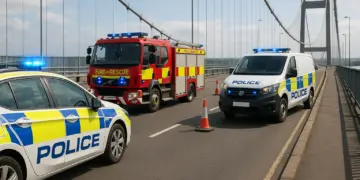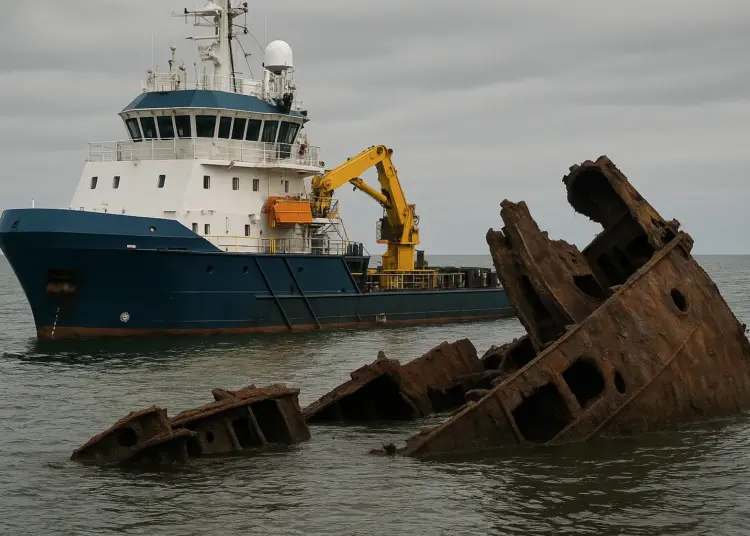Story Highlight
– Support vessel lacked proper lookout arrangements.
– Incident involved a fatal collision with a recreational driver.
– Victim was exploring a German battleship wreck.
– Investigation highlighted safety oversight issues.
– Recommendations may follow to improve maritime safety.
Full Story
A recent inquiry has revealed that a support vessel lacked adequate lookout measures when it collided with a recreational diver exploring the wreck of a German battleship, resulting in a tragic incident. The diver, identified as Paul, was engaged in underwater exploration when the accident occurred, prompting a thorough investigation into the circumstances surrounding the incident.
The investigation, conducted by marine safety authorities, highlighted several critical failings in the safety protocols aboard the support vessel. Among these was the absence of proper lookout arrangements, which are essential in preventing accidents, especially in areas frequented by divers and other water users. The inquiry’s findings emphasize the importance of vigilance in maritime operations to safeguard all individuals on the water.
Witnesses to the incident reported that the support vessel was navigating the waters in proximity to the wreck site, an area known to attract divers and history enthusiasts alike. Despite the presence of divers in the vicinity, it appears that the crew did not maintain a proper visual lookout, leading to the devastating collision. Such oversights can have catastrophic consequences, as highlighted by the unfortunate outcome in this case.
Experts in maritime safety have pointed out that the findings serve as a stark reminder of the responsibilities that come with operating vessels in busy waterway areas. “Effective lookout practices are not only essential for the safety of divers but also crucial for the proper management of maritime traffic,” stated Dr. Emma Grant, a marine safety consultant. She further stressed that training and adherence to safety protocols must be prioritised by vessel operators to prevent similar incidents.
The wreck of the German battleship, which has drawn scuba divers and history buffs for years, is located in a region known for its rich maritime history. The site has been monitored closely in recent years due to its popularity among adventurers seeking to explore sunken vessels. However, with such traffic comes an enhanced responsibility for vessels operating in those waters, reinforcing the need for heightened awareness and safety measures.
Following the investigation, recommendations have been put forth aimed at improving safety standards in the area. These include implementing mandatory training sessions focused on lookout protocols for all support vessel crews operating near popular diving sites. Additionally, increased awareness campaigns targeting both divers and vessel operators are being urged to educate on the risks and responsibilities involved when navigating these waters.
Local diving associations have expressed their concerns regarding the incident and the potential risks involved in such activities. “The safety of divers should be paramount, and this tragic event has highlighted the urgent need for better communication and safety practices among watercraft,” said Tom Richards, president of the local diving community. He emphasised the importance of collaboration between divers and operators to enhance overall safety measures in the region.
As the community reflects on this incident, it becomes evident that maintaining safety is a shared responsibility. Increased vigilance and adherence to existing maritime regulations must be a priority to prevent future tragedies. In the wake of this investigation, there is a collective call for vessel operators to recognise their role in ensuring the safety of all those who share the waterways.
The consequences of this incident will continue to resonate within the diving community, prompting discussions about safety, training, and cooperation among maritime users. The tragic loss of Paul serves as a somber reminder of the importance of adhering to safety measures to prevent further incidents and safeguard the lives of all individuals engaged in recreational diving and boating activities. As recommendations are examined and discussed, there is hope that changes will be implemented to ensure a safer experience for all adventurers on the water.























This is tragic and preventable. Adequate lookout procedures and clear roles for lookout duties are basic maritime safety essentials. Crew training in situational awareness and man overboard and diver safety protocols should be mandatory, and operators must ensure rescue equipment and communications are ready and tested before each outing. Regulators and operators need to work together to enforce standards and share lessons so that recreational users and commercial crews alike understand their responsibilities in congested waters.
This is a tragic reminder that basic safety practices save lives. Proper lookout is a fundamental responsibility on any vessel and cannot be treated as optional. Mandatory training for crew, clear assignment of lookout duties, and better communication between recreational users and commercial or support vessels are essential. Authorities and operators must act now to ensure robust procedures, regular competency checks, and reporting of near misses so that similar avoidable deaths do not happen again.